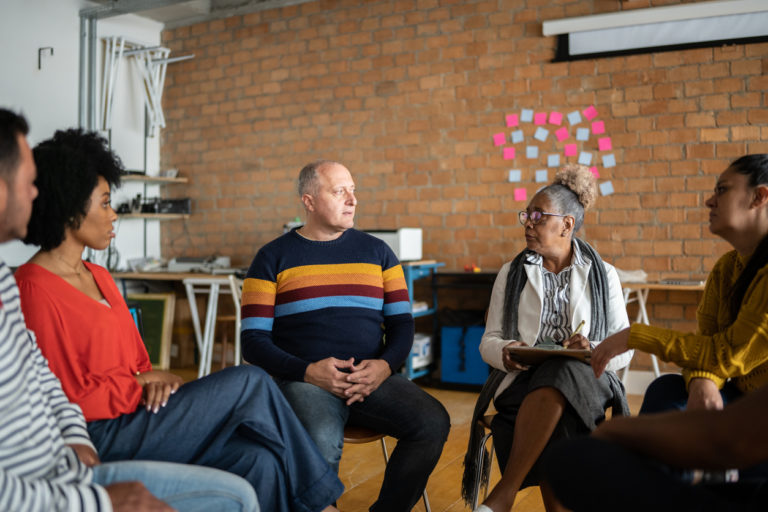Located on a beautiful campus six miles from Leeds – one of the UK’s best student cities – Leeds Trinity University has been providing outstanding, higher education for more than 50 years.
Its pioneering inclusion of professional work placements with every degree helps make it one of the UK’s top universities for graduate employability. Ninety-seven per cent of its graduates are in employment or further study 15 months after graduating (Graduate Outcomes, HESA 2022).
Research, advanced scholarship and knowledge exchange are a fundamental part of life at Leeds Trinity University. It is recognised internationally for producing high-quality research by the Research Assessment Exercise (RAE) and Research Excellence Framework (REF), with 84 per cent of its publications of international quality.
Our Spotlight features just some of Leeds Trinity University’s innovative, health-related research and, how working in partnership, it is having a ground breaking impact in communities.
We also highlight Leeds Trinity’s leading provision of health and care related apprenticeships.
In part one, below, we look at how the University is working to ensure research improves lives and benefits communities in the here and now. And in our first example of this, we see how new research is helping people better manage their mental health.
Taking a fresh look at research.
Alex Wood, Professor of Psychology at Leeds Trinity University, joined the institution in April 2022 to provide strategic guidance and mentoring in social and health sciences. This is to support the University’s aim of accelerating a step change in the quality and environment of research at the University.
Alex explains: “A focus on impact-driven research, research that is led by the needs of the end user, is rare. Leeds Trinity is in a unique position of having established relationships with organisations and communities and already co-designs programmes based on the needs of those groups.
“My aim is to combine the rigour of traditional research and a strong evaluation component, with the existing knowledge exchange approach at Leeds Trinity. In this way we will address the limitations of an “ivory tower” approach to research and turn traditional academic research on its head.
“Our work will demonstrate that by grounding the research in real needs, co-designing programmes with stakeholders to address those needs, and measuring impact effectively, we can improve lives and benefit communities in the here and now.”
Quantifying impact, particularly in the area of well-being, is one area that Alex is actively reviewing, as well as engaging with stakeholders to build on the strength of existing programmes at Leeds Trinity.
He is currently working with colleagues and the West Yorkshire Police to develop a 360 degree assessment programme of newly qualified police officers that has a distinct focus on well-being.
Global recognition
Alex is globally recognised for his research into behavioural science, economic, clinical, personality, and health psychology and he has first-hand experience of designing and implementing practical mental health improvement programmes.
In 2017 Alex began a major humanitarian project to develop Cambodia’s first modern mental health service in primary care, in collaboration with the NGO HOPE and the Cambodian Government, where he spent most of this time in the field.
Alex concurrently held the Centennial Chair at the London School of Economics and Political Science (LSE), in “a scheme to attract to the School, academics of outstanding international distinction in their field of study”.
Research that brings tangible benefits
With such extensive practical experience and academic excellence in the field of mental health and wellbeing, together with his integrative and holistic approach, Alex is ideally placed to collaborate on a broad range of projects, and to identify and focus upon the precise needs of organisations and their individual staff.
By committing to this approach, Leeds Trinity University is unlocking the huge potential for research to have a positive, lasting, impact on a wide range of organisations and communities.
Mental health research – helping people help themselves
Over 3 million people were in contact with mental health services* and nearly 65 per cent of people in the UK say that they have experienced a mental health problem in the last year, rising to 7 in 10 of those aged 18-35, women, and those living alone**. New research at Leeds Trinity University is helping to shine a light at the end of what is a long and dark tunnel for many.
Dr Lisa Webster, Reader at Leeds Trinity University in the School of Psychology and Therapeutic Studies, is taking an innovative and very practical approach that aims to help people better manage their mental health and prevent mental ill-health developing into severe mental illness.
Lisa’s work started with members of the UK student population, where research has shown that less attention is placed on those students who are at risk of mental ill health, than those who are at risk of developing severe mental illness.
By identifying students at risk of mental ill health and exploring what prevents them from seeking help from university wellbeing units, Lisa determined that training in resilience would equip these students to deal with issues and help prevent the deterioration of their mental health.
Research that delivers practical benefits
Lisa’s next step was to lead the “SoWise Vision Day”. This is a research, innovation, and knowledge exchange event that brought together researchers and key local and national stakeholders in student mental health, including representatives from Student Minds, Together Women, and YoungMinds.
Building on her research and the findings of this collaboration, Lisa designed and delivered resilience-based training to staff in all departments at Leeds Trinity, as well as incorporating materials for students into teaching modules and personal tutoring.
A University-wide initiative Learning to Be provided a six-week programme to develop resilience, increase awareness of mental ill health, promote positive coping strategies and encourage students to seek help.
In addition, Leeds Trinity’s Mental Health and Wellbeing Service delivered sessions to students before their placements. Evidence showed that this significantly reduced the numbers of students seeking help from the service in the periods following their placements.
This led to the service designing hugely successful, online resilience-based training following the first Covid-19 lockdown. Over 200 students participated, and the service reported that “less than 10 of these students subsequently referred themselves for further support, indicating that the research has contributed to the students being empowered to manage their own mental health.”
Building resilience in this way considerably reduced the waiting lists and the University Mental Health and Wellbeing Service was able to help more students in need of support.
Because of the demonstrable success of this research, Lisa developed further bespoke resilience-based training that has helped private, public, and third sector organisations build mental health resilience in their staff. All of them have reported a tangible, positive, impact on working practices and wellbeing.
International impact
The influence of Lisa’s research does not stop there.
Lisa was invited to act as Senior Scientific Advisor at the International Cognitive Sciences Arena in Italy and then to deliver further in-depth seminars to students at the University of Bozen-Balzano on student mental health and adolescent resilience.
This has led to the development and launch of a multi-site international study investigating the impact of isolation on student mental health, resilience, and connectedness to learning; with a further study currently being undertaken in Australia.
The success and influence of this research is undisputed, and Lisa sums it up: “It has been so rewarding to work with mental health and wellbeing practitioners in the University, businesses, and charities. Together we have taken the initial findings of evidence-based research and brought tangible benefits to those suffering from mental ill health. This programme demonstrates perfectly the potential and impact of research and collaboration in action.”
Leeds Trinity University Vice-Chancellor Professor Charles Egbu said: “We are delighted to feature in this Spotlight series just some examples of our excellent work. They show how important we believe it is to ensure our world-class research makes really positive and lasting impacts on communities and on individual people’s lives.
“With our strong focus on education and training in the healthcare sector, and on our research helping transform people’s health and wellbeing, collaborating via Leeds Academic Health Partnership is a vital part of us growing and spreading this impact.”
*NHS Mental Health Services monthly statistics report March 2022
** UK Mental Health Foundation July 2022



